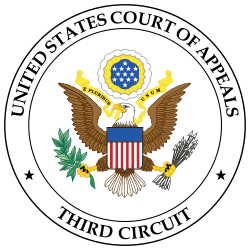Fraternal Order of Police v. City of Newark facts for kids
Quick facts for kids Fraternal Order of Police v. City of Newark |
|
|---|---|
 |
|
| Court | United States Court of Appeals for the Third Circuit |
| Full case name | Fraternal Order of Police Newark Lodge No. 12; Faruq Abdul-Aziz; Shakoor Mustafa v. City of Newark; Newark Police Department; Joseph J. Santiago, Newark Police Director; Thomas C. O'Reilly, Newark Chief of Police |
| Decided | March 3, 1999 |
| Citation(s) | 170 F.3d 359; 79 Fair Empl. Prac. Cas. (BNA) 323; 75 Empl. Prac. Dec. (CCH) ¶ 45,820 |
| Case history | |
| Prior history | District Court ruled in plaintiffs' favor |
| Court membership | |
| Judge(s) sitting | Morton Ira Greenberg, Samuel Alito, Theodore A. McKee |
| Case opinions | |
| Majority | Alito, joined by a unanimous court |
Fraternal Order of Police, Newark Lodge No. 12 v. City of Newark was an important court case from 1999. It was about police officers in Newark who were told they had to shave their beards. The officers argued this rule went against their religious beliefs.
The Third Circuit Court of Appeals decided that the police department's rule was unfair. They said it violated the officers' right to practice their religion freely. This right is protected by the First Amendment of the United States Constitution.
Contents
Why the Case Started
The Newark Police Department had a rule that all officers must be clean-shaven. However, there were two exceptions to this rule. One exception was for police officers working undercover. The other was for officers with certain medical skin conditions.
Two police officers, Faruq Abdul-Aziz and Shakoor Mustafa, were Sunni Muslim. Their religion requires them to wear beards. They felt that the department's shaving rule violated their religious freedom. The Fraternal Order of Police, a group representing police officers, supported them.
The officers took their case to a lower court, the United States District Court for the District of New Jersey. This court agreed with the officers. It stopped the police department from making them shave their beards.
The Court's Decision
The police department then appealed the decision to the Third Circuit Court of Appeals. This higher court had to decide if the lower court's ruling was correct.
Judge Samuel Alito wrote the court's opinion. He explained that the police department's rule was not fair. The court looked closely at the rule and its exceptions.
Understanding the Exceptions
The court found that the exception for undercover officers made sense. It did not go against the idea of officers looking uniform. Undercover officers need to blend in, so they might need to look different.
However, the court saw a problem with the medical exception. If an officer had a skin condition, they could keep their beard. This showed that the department was willing to let some officers have beards for non-religious reasons.
Why Religious Reasons Mattered
The court pointed out that the department allowed beards for medical reasons, but not for religious reasons. This suggested that the department valued a medical reason more than a religious one.
Because of this, the court said the rule needed "strict scrutiny." This means the court would examine the rule very carefully. The police department had to show a very strong reason for its shaving rule. They also had to prove that their rule was the only way to achieve that goal.
The court decided that the police department did not have a strong enough reason. Therefore, denying the officers an exemption for their religious beliefs was wrong. It violated their Free Exercise rights under the First Amendment.
What This Case Means
This case is important for understanding religious freedom in the United States. It built on an earlier Supreme Court case called Employment Division v. Smith. In that case, the Supreme Court said that generally fair laws do not violate religious freedom, even if they make it harder to practice a religion.
But Fraternal Order of Police v. City of Newark added something new. It said that if a law has exceptions, it might not be "generally fair" anymore. If a law allows exceptions for some reasons (like medical ones) but not for religious ones, it might be unfair to religious people.
This decision was discussed when Judge Samuel Alito was considered for the Supreme Court. It showed his views on religious freedom and how courts should protect it.

